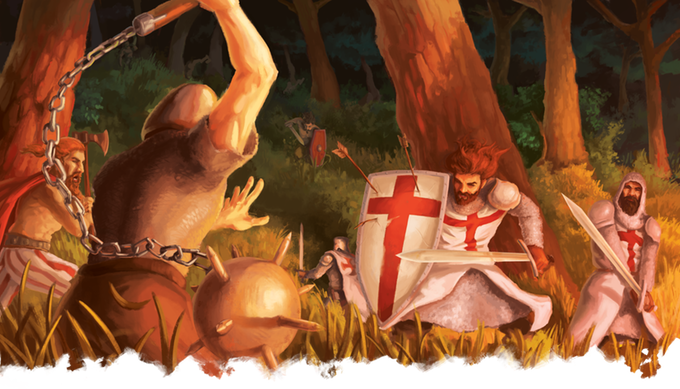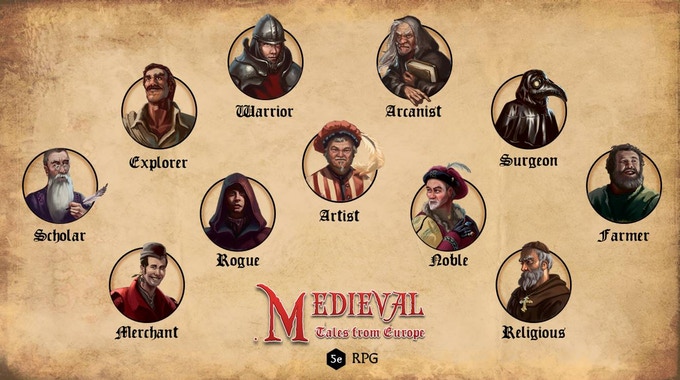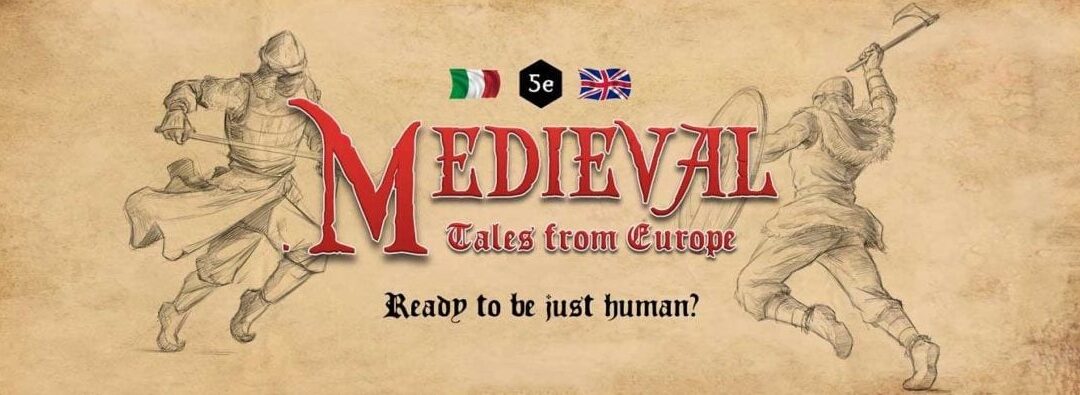
Sunday 8th December the kickstarter project of Medieval, Tales form Europe, began its journey to become a physical reality played in Italy and in the rest of the world. What is it all about? It’s a setting for D&D 5E created to play in a realistic medieval Europe with specific contents and rules. The description of the campaign is rich of infos, so there’s a lot to talk about!
THE AUTHORS

It’s the first project for “Tales for Games Publishing”, so we have no comparisons at all. It seems to be the first experience for the authors.
Illustrators obviously have their beaufitul online portfolios and I appreciated theric choice, a good mix of realism and fantasy. I hope I’ll see some double page arts in the book.
THE KICKSTARTER PROJECT
I’m very happy the project is both in Italian and English, to open up to new international backers in order to reach a greater public, greater funds, and greater hopes of stretch goal for everyone. I also like the decision of set the prices with shipping costs included (for Europe and North America), it’s good to have control over the final budget from the beginning. The estimated time of delivery is about an year, but we are talking about Kickstarter so I will certainly not sign the date on my calendar.

The page is well edited, with links to quickstart, interviews, with illustrations and previews. The early birds are convenient and if the final quality will be as much as the one we are seeing now, even the price is interesting. My preference is on 40€ early bird pledge to get physical manual and the PDF. Than it’s time to hope that some stretch goals will be unlocked, especially the physical ones. That would make the money very well spent.
While this article is being written the collected funds are about 4000€ of 27000€ required to make the printers run. It’s not a rush start, but surely there is time to reach the final goal.

Graphic, editing, spacing, texts, they all seem being done with attention and quality. They’re previews made to hunt down young and naive backers so they must be done with attention and quality, but if this level will be keep mantained for all the book then it will be a real pleasure to read. For what I saw, there is preparation and skills behind these examples.
REALISM, THEY PROMISE
The task of realizing a realistic game is always tough and fascinanting and there are many efforts in the past. I personally like campaigns where the survival of the character is tested not only with rough fighting but with every aspect of a hero life, from his daily routines to his proficiencies, realizing a 360° management of a character. A combat less centered on a long and repeated sequence of hits and more focused on preparation of few strong and deadly assaluts to finish quickly the enemy finds me completely in agreement. The privileged access for only some classes or ranks to different kind of weapons is another realistic aspect that I appriciated, with the consequential implementation of brawling and unarmed rules. I hope to see headbutts!

But it’s difficult to find the right balance in a low magic game with high mortality rate. Everything is cool until a couple of unlucky rolls makes you create another character. Maybe many players like it, but I think that we gather around a table to tell stories and too many interrupted stories at the end ruin the game. Balance mechanisms are required, a well studied alea management and countless hours of playtest. How will the result be? I will keep this doubt with me until I’ll try the game at the table, or at least read the manual.
NOT ONLY PUNCHES AND SWORDS

It’s a beautiful choice bringing into a game the legacy of history and tradition of Europe. From what I saw in the quickstart there is a good effort of giving the right infos to create the correct frame for a character, socially and historically speaking. Therefore no one of the authors is a historian, so we will not see a perfect level of plausibility (also difficult to keep in game), but I think it could be a good mix of accurate and plausible, that gives players the sensation of being exactly in the medieval setting they are looking for. But the presence of a historian in the authors team granting a minimum level of control on content would have been a great plus.
The decentralization of fighting is another noble proposal, but how will it work in terms of play and playability? Many rpg and rpg systems talk about touching every aspect of life, but in the hand the choice is for masters and players. How much fighting and how much “else” they put in their stories. Without mechanisms that will help bring thes “elses” in the game we will have only the choice of masters and players. From here I ask to myself it I really need a handbook that tells me how to give importance to undervalued elements. Will it help us bringing them into the game or they’ll remain words, advices and possibilities written among the pages? I’m curious to see it the promises will be kept.
ONE MORE DOUBT
We could talk about many other topics implied in the kickstarter page, but truth is that we need to read and play the final product in order to fully understand what we are talking about. There are a lot of beautiful premises for fighting, character management, travels, esotericism, low magic elements in a pseudoreal historical setting. At the end everything will depend on how everything will be done (Obvious, I know). When a game or a setting are more limited and precise in their concept it’s easier to express an opinion. In Medieval there’s freedom in managing the historical setting (keel the History, change the History, modify details) and in such a fluid setting it’s not easy insert and balance a lot of other aspects and keep them balanced, playable, intersectables AND keep the realism plausible. The risk is creating a half fantasy half realistic hybrid with an European geography.
CONCLUSION
I see lights and shadows on the project, as normal. But I see also passion, effort, courage and determination. Compared to other setting it’s more difficult to understand if the final product will be as described and if authors will keep their promises, but the quality and the level of detail make me quite optimistic. Regardless of that, the final manual will probably be a high quality handbook and a very enjoyable reading.

PROS
- High quality previews
- Well detailed project
- The promise of let us play in a realistic medieval Europe with D&D 5E
CONS
- The premises are not easy to be fulfilled.
- Many elements to balance without losing in realism and plausibility.


Volevo segnalare che questo progetto e’ attivo, diverse modifiche sono state apportate al sistema e ha acquisito una forma ancora migliore. Una nuova campagna Kickstarter e’ prevista per l’anno in corso.
Siamo molto attivi sulla pagina Facebook https://www.facebook.com/MedievalTheRolePlayingGames
E sul gruppo di discussione correlato
https://www.facebook.com/groups/461442485476717
Grazie mille per l’aggiornamento!